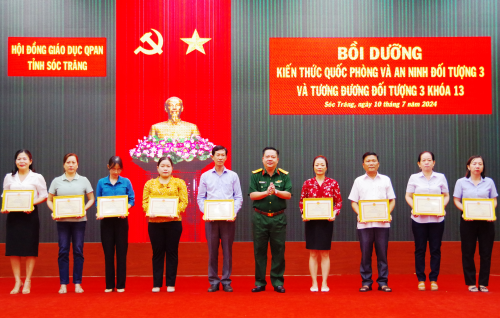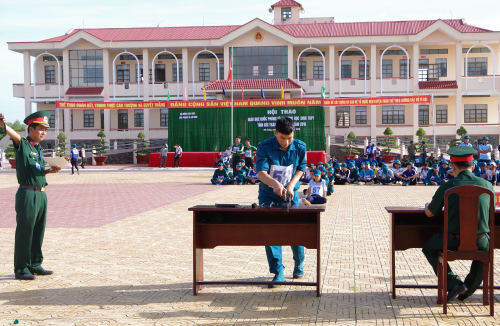Located in the East of the Mekong Delta, with 72km of coastline, a population of nearly 1.2 million people in which Khmer people account for 30.19%, 64 religious entities with more than 640,000 dignitaries, monks, etc., Soc Trang province has an important position in many aspects, especially in terms of defence and security for Military Region 9 and the Southern region. Rercently, the Party Committee, government, armed forces and people of the Province have always strived to promote revolutionary traditions and achieved quite encouraging results in all aspects. Its economy has seen remarkable growth; its national defence and security have been consolidated and enhanced; and people's living standards have gradually been improved. However, besides the achievements gained, there remain potential risks and factors of instability in the province. These include sabotage of hostile forces in the name of ethnic and religious issues, the increasing rate of crime, especially high-tech crimes, drugs, illegal credit, etc., adversely affecting the development and implementation of military and defence tasks. To cope with this situation, the Province has implemented leadership and direction solutions synchronously, linking socio-economic development with consolidating and enhancing national defence and security, in which promoting defence and security education is considered an important solution, aiming to build strong political and spiritual potentials in the defence area.
 |
| Leader of the Provincial Military Command awards outstanding learners of defence and security training in 2024 |
First of all, the Province strengthens the leadership and direction of local Party committees and goverments for the task of defence and security education. Thoroughly grasping the resolutions, directives and guidelines on defence and security education, the Provincial Military Command, as the Standing Body of the Provincial Council for Defence and Security Education, has proposed to the Provincial Party Committee and the People's Committee many policies and measures to lead and direct agencies, units and localities in the province to implement this work effectively. In particular, it has elaborated and promulgated documents instructing the implementation in a serious and comprehensive manner, involving the entire political system to improve the effectiveness of state management of this work. At the same time, it strengthens inspection and supervision of implementation; takes the results of implementing defence and security education work as a criterion to evaluate the leadership and management capacity of Party committees, Party organisations, authorities and leading cadres at all levels. Along with that, it advises the Provincial Council for Defence and Security Education to implement annual national defence and security education plans seriously and consistently. Besides, it carries out preliminary and final summaries seriously to promptly overcome limitations and shortcomings together with commendation as a way to replicate good, creative, and effective practices throughout the province. As a result, the awareness and responsibility of all levels, sectors, and the entire population have seen significant changes; the leadership capacity of Party committees, the management and operation of the government for defence and security education in the province have been enhanced, creating a solid foundation for conducting this work.
Improving and enhancing the effectiveness of the Councils for Defence and Security Education at all levels is one of the solutions that the Province concentrates on in order to make sure that this work is implemented seriously and consistently. To make it effective, the Provincial Military Command advises the Provincial Party Committee and the Provincial People's Committee to direct localities, agencies and units to regularly review and consolidate the councils with sufficient numbers and appropriate structure as per regulations. The province requires that council members at all levels clearly define their roles and responsibilities, closely follow their functions and tasks, and work in accordance with regulations and plans; focus on improving the quality of consulting, directing, and inspecting the implementation of this work in localities, agencies, and organisations.
To effectively implement defence and security education for the subjects, the Province directs the Provincial Military Command to closely follow Decree No. 139/2020/ND-CP dated 27 November 2020 of the Government, directives and instructions of the Council for Defence and Security Education of Military Region 9, to develop plans for defence and security education and training for the subjects in each stage and each year suitable to the local reality. In recent years, in addition to the good implementation of defence and security training for subjects according to the law, the Province has directed the expansion of training subjects to include religious dignitaries, fishermen, and business owners with practical results. In the key areas of national defence and security, areas with a large number of religious followers, fishing villages, and fishing ports, the Province has assigned council members, groups of reporters to direct, conduct propaganda, and disseminate defence and security knowledge.
 |
| Holding defence and security contest for high school students |
For students, every year the Provincial Military Command closely coordinates with the Department of Education and Training to effectively implement Joint Circular No. 123/2015/TTLT-BQP-BGD&DT-BLDTBXH, dated 05 November 2015 of the Ministry of National Defence, the Ministry of Education and Training, and the Ministry of Labour, War Invalids and Social Affairs. Every year, the Community College and the Vocational College closely coordinate with the Military School of Military Region 9 to hold defence and security courses for students. For the remaining schools, especially high schools, the Province requires them to regularly update content, and carry out sufficient contents of education as per regulations. During process of education, they are required to include extracurricular activities, field trips to traditional houses, defence and military works, historical relics, etc. in the area to enhance students’ patriotism.
To strengthen propaganda and dissemination of defence and security knowledge to all people, the Provincial Military Command coordinates with the Department of Propaganda and the Department of Information and Communications to advise and direct the news agencies and newspapers of the Province and districts, towns and cities to maintain specialised pages, columns and articles suitable for each target and locality, especially for remote areas, ethnic minority areas and religious people. The Provincial Radio and Television regularly broadcasts the "All people’s National Defence" column with good news and articles. The localities have spread propaganda content in major holidays, festivals, religious activities, and activities of mass organisations, focusing on the Party's viewpoints and guidelines on Fatherland protection in the new situation, policies on ethnicity and religion; revolutionary traditions of localities; plots and tricks of hostile forces, etc. Thereby, people’s awareness about the task of Fatherland protection has been enhanced. They have become more active in maintaining political security, social order and safety in the area.
In order to meet the high requirements of defence and security education in the new situation, the Province has ceaselessly improved the quality of the lecturers, reporters, and propagandists who participate in defence and security education, because they are the one directly conduct and play a decisive role in the quality and effectiveness of this important work. Accordingly, the Province directs the Provincial Military Command to coordinate with the Provincial Party Committee's Propaganda Department, the Provincial Puplic Security, the Department of Education and Training and localities to make survey and evaluate the true quality of this staff, then proactively develop training plans in the direction of "standardisation" in terms of knowledge, practical experience, and pedagogical skills. The province requires that training content is focused on improving the quality of lectures; skills in combining teaching methods with information technology application; skills in combining theoretical presentation with practical examples to demonstrate, illustrate, and interest learners. As a result, the contingent of lecturers, reporters, and propagandists participating in this work have developed high levels of qualifications and expertise. They are energetic, enthusiastic, responsible, and creative in teaching, and handle all the contents of defence and security education very well.
With the above synchronous solutions, in recent years, defence and security education in Soc Trang province has seen both intensive and extensive developments. Currently, the Provincial Military Command has advised the Provincial Party Committee and the Provincial People's Committee to conduct a survey and build a Defence and security training area which is expected to be put into operation in March 2026, in order to further improve the effectiveness of this work, contributing to building a solid "people's heart and mind posture", a strong national defence, and a favourable environment for the province to implement the goal of becoming a developed province, a driving force of the Mekong Delta region.
Senior Colonel TRAN QUOC KHOI, Member of the Provincial Party Committee Standing Committee, Commander of the Provincial Military Command, Permanent Vice President of the Provincial Council for Defence and Security Education